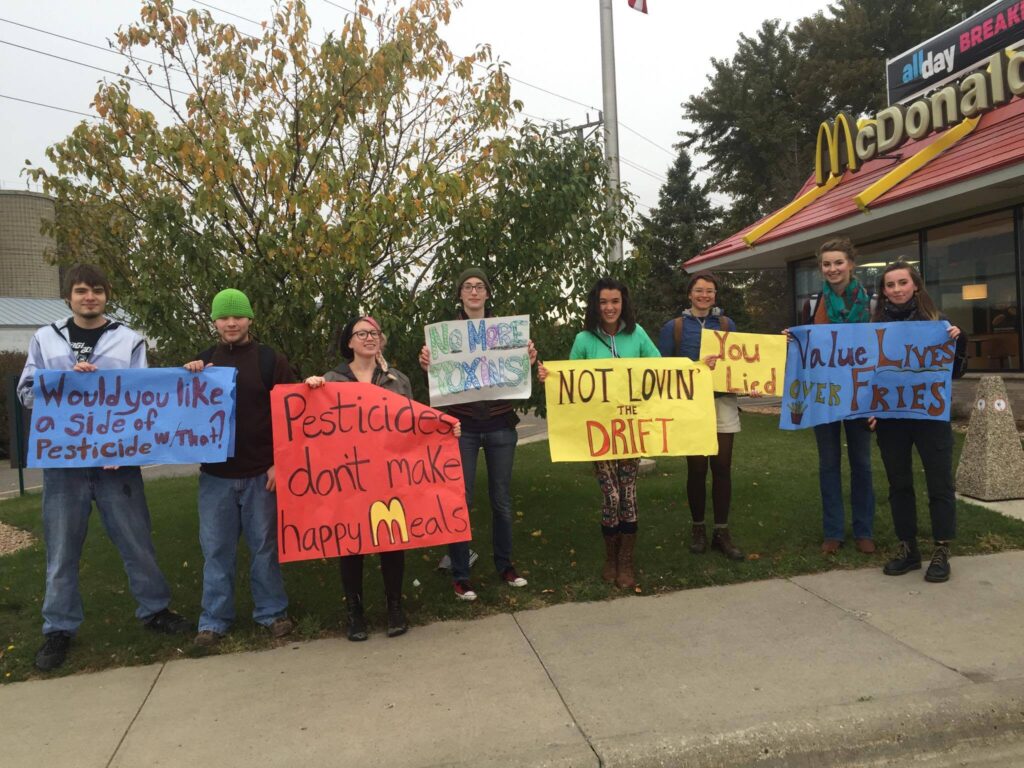In 2009, McDonald’s made a promise to U.S. consumers because of the work of a small group of rural Minnesotans living around RD Offutt’s (RDO) potato fields. McDonald’s promised to cut its use of pesticides on its French fries. Seven years later little has changed in McDonald’s pesticide consumption. Those rural Minnesotans are still sprayed weekly with carcinogenic chemicals by helicopters flying over their homes and the potato fields.
In Minnesota alone over 45,000 acres of potatoes are grown annually using billions of gallons of water along with an array of chemicals applied through irrigators, via helicopter or plane, and on the ground almost constantly throughout the growing season. Across the U.S. nearly 2 million pounds of pesticides are applied annually to industrial potato crops so we can have long, white, even, french fries.
Rural Minnesotans have been fighting an uphill battle against potato giant RD Offutt for decades. The nation’s largest potato producer began growing potatoes in the mid 1960’s near Pine Point on the edge of the White Earth Indian Reservation and now grows over 12,000 acres across the state and over 50,000 acres nationwide.
RDO is the largest potato producer in the US and McDonald’s is one of their largest buyers.
“People are sick of getting sick. That’s why we’re partnering with Corporate Accountability International, the Pesticide Action Network, and dozens of other groups around the country to make it stop.” said Toxic Taters Coordinator, Amy Mondloch

Dianne Wylie, a mother and grandmother and neighbor to RDO’s potato fields, is one many impacted by pesticides sprayed weekly during the growing season as well as by intensive irrigation. “An aerial sprayer in a yellow plane proceeded over my property line past a buffer zone, did not shut off his chemical sprayer, spraying my trees, hay, horses, dogs, chickens, and teenage daughter. In another instance a yellow crop dusting plane proceeded over my friend’s home across the same field spraying a granddaughter, the home, horses, hay bales, and us. This plane made several passes all while spewing chemical. Our efforts to garner attention only succeeded when I threw a red folding camping chair up into his flight path. He was at a very low altitude just over the crops. After that he managed to shut his sprayer off. Leading us to concede he was just lazy or indifferent.”
“I wish we could say that Dianne’s story is unusual, but it’s not. Toxic Taters talks with hundreds of people each year who have stories of being affected by pesticides. We hear the stories of those who’ve been sprayed, those who’ve lost crops, lost livestock, had to replace their wells, and most disturbingly those who’ve gotten sick and who’ve lost friends and family members.” Said Mondloch
One of the reasons that Toxic Taters chose to McDonald’s as the focus for its attention is that kids are a particularly harshly affected by pesticides. According to “Kids on the Frontline: How Pesticides Are Undermining the Health of Rural Children” released by the Pesticide Action Network in May, rural children get roughly double the dose of pesticides of their urban counterparts through inhalation, residue, and water contamination.
For Toxic Taters this has translated into concerns about developmental disabilities. The majority of school districts in the potato growing region have special education rates that are higher than the state average, sometimes by ten or more percentage points. It’s also meant concerns about other illnesses including leukemia, non-Hodgkins lymphoma, and other cancers.
The struggle, led by the grassroots organization, Toxic Taters, has taken several huge strides forward in recent years. The group has collected over 25,000 petition signatures asking McDonald’s to pressure RD Offutt to cut their pesticide use, make public the chemicals used, fund studies on the human and ecological health effects on surrounding communities, and farm sustainably. Working with the Pesticide Action Network (PAN) they’ve also hosted statewide and national days of action. This year Corporate Accountability International will be working with PAN and Toxic Taters to hold a full week of action from October 2-8 including a national webinar on October 3rd, online actions, and local events hosted by community groups across the U.S. and Canada.

The theme for this year’s week of action is “Farm to Family: Pesticide Free.” From October 2 to 8 groups will be pressuring McDonald’s to follow through on 2009 promises made by the company to cut their pesticide use, drawing attention to the particular impacts of pesticides on kids.
Toxic Taters encourages people to join the week of action by taking part online or hosting a local event. More information about the campaign, how to take part, and the work of Toxic Taters can be found by calling 218-375-2600


